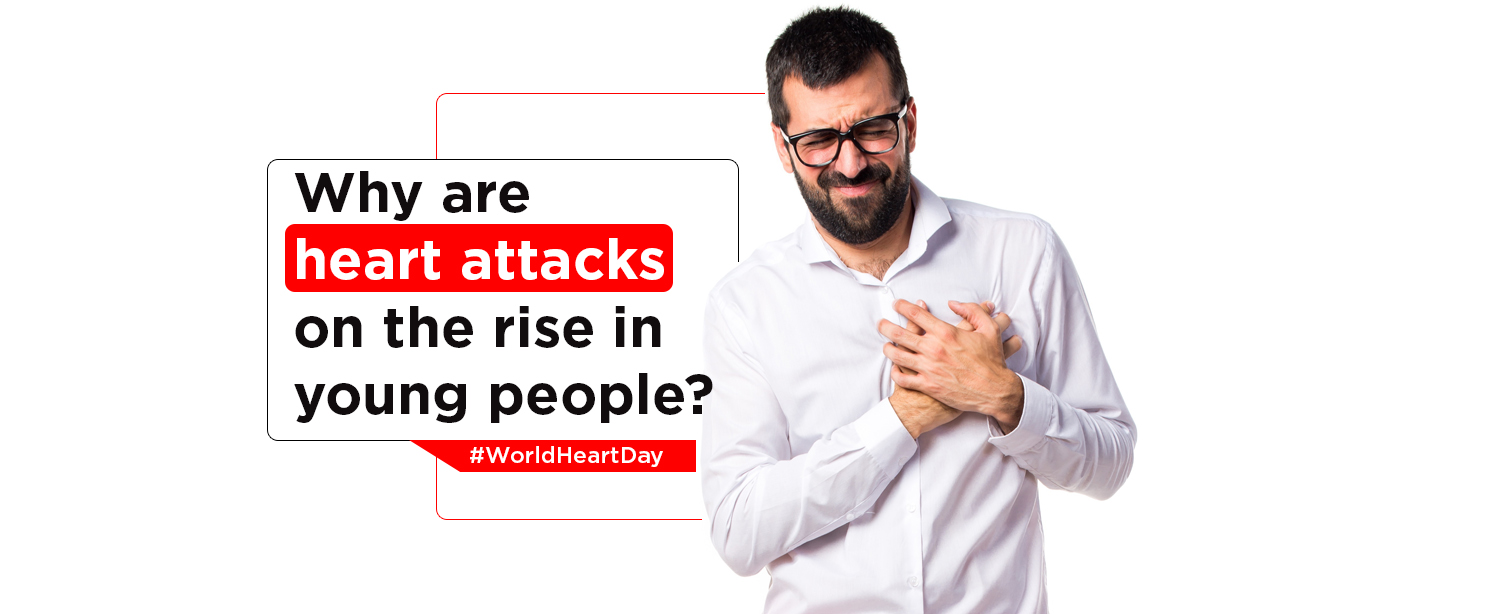The leading cause of death among Indians, heart disease kills close to three million lives annually! Heart attacks and cardiac arrest are both sudden cardiac events that can happen at any time. According to the Indian Heart Association, 50% of all heart attacks in Indian men happen before the age of 50, and 25% happen before the age of 40. The number of heart attacks and cardiac arrests are rising every day, especially among young Indians.
Indians are said to be genetically inclined to develop coronary heart diseases. A major shift in lifestyle habits over the last two decades have contributed to an increase in other risk factors such as diabetes, hypertension, smoking and consumption of junk and processed foods. As a result, it’s critical to promote in young people an understanding of risk factors and symptoms, a healthy lifestyle, and prompt and appropriate medical intervention.
What leads to Heart Attacks in youngsters?
Since the beginning of time, cardiovascular disorders have existed. Cardiac disorders have now started to afflict the younger population as well, deviating from its usual pattern of focusing on the elderly and those with pre-existing heart ailments. The incidence of heart attacks among people in their 30s and 40s is rising due to lifestyle choices, dietary habits, and hereditary problems. Some patients are reporting post-COVID heart problems, clotting difficulties, and complications as a result of the epidemic, putting them vulnerable to heart diseases. Increased stress is another risk factor that has grown to be a major cause of heart attacks, particularly during this pandemic. Your degree of fitness, diet, way of life, and family history all significantly influence your chance of developing cardiac illness. Knowing your health numbers is crucial for taking action to correct any abnormalities especially those including diabetes, hypertension, high cholesterol, and hyperglycemia.
Stress and Cardiac disease
Today’s generation definitely leads a more fast paced and stressful life as compared to the older generation. Stress and anxiety have frequently been connected to cardiovascular illnesses. According to studies, having high cortisol levels over an extended period of time may raise a person’s chance of developing high blood pressure, triglycerides, blood sugar, and cholesterol.
How to prevent Heart disease
The most crucial step is to have your cardiac check-up by a specialist. If a person has a significant family history of heart conditions, they should, if necessary, see a cardiologist or cardiac electrophysiologist. It is essential to start leading a healthy life from a young age. Apart from the annual heart health checkups here are some preventive measures that can help reduce your heart-attack risk:
- Manage your blood pressure
A significant risk factor for heart disease and stroke is high blood pressure. When your blood pressure, or the force of blood flowing through your blood vessels, is continuously too high, you have high blood pressure, sometimes referred to as hypertension. When your blood pressure is in control it puts less stress on your heart, arteries, and kidneys. - Control your cholesterol
High cholesterol makes plaque more likely to form, and plaque can obstruct arteries and cause heart disease and stroke. Your arteries have the best chance of remaining unblocked when your cholesterol is under control. - Reduce blood sugar
Diabetes increases your risk of developing heart disease. Even slightly elevated blood sugar levels can cause your blood vessels to begin to deteriorate over time, which can result in serious cardiac problems. - Stay active
One of the most wonderful things you can offer your heart and yourself is an active life. Adults should engage in 75 minutes of strenuous exercise, 150 minutes of moderate exercise, or a combination of both, throughout the course of the week. Every day, children and teenagers should engage in at least 60 minutes of physical activity. - Eat heart healthy
A healthy diet is one of your best weapons for fighting heart disease. Include more fruits, vegetables, whole grains, beans, legumes, nuts, plant-based proteins, in your diet. Limit your intake of sweetened drinks, sodium, processed meats, refined carbohydrates and trans fats. - Maintain a healthy weight
When you maintain a proper body weight, you will reduce the burden on your heart, lungs, blood vessels and other organs. Eat a healthy diet; manage stress and exercise regularly to stay fit. - Stop smoking
The risk of cardiovascular disease is increased in cigarette smokers. The best thing you can do for your heart health is to stop smoking if you currently do so. Stop using all forms of tobacco to protect your heart health. - Avoid alcohol consumption
Regular drinking or binge drinking can hurt your heart and lead to diseases of the heart muscle, called as cardiomyopathy. Alcohol use is also known to raise your blood pressure. - Heart health screenings
Heart checkups help identify those at risk of future cardiovascular events of the heart and other major body organs. It also helps ascertain the modifiable risk factors, which are reversible and reduce one’s risk of developing cardiovascular disease. - Cope better with stress
Stress can increase inflammation in your body, which is known to harm your heart by increasing the blood pressure and lowering “good” HDL cholesterol. Manage stress better with strategies that include meditation, pursuing a hobby, spending time in nature or reading a book.
Cardiac care at Kokilaben Dhirubhai Ambani Hospital
Are you young and healthy? We truly believe that preventive cardiac care must start at a young age for all. Be proactive about your heart health and take the required steps. Consult our highly trained team of cardiologists for preventive cardiac care, prompt diagnosis and world-class treatment options. Kokilaben Dhirubhai Ambani Hospital is equipped with state-of-the art cardiac facilities. With over 8500 cardiac surgeries, successfully conducted in the past our team is well experienced to handle the most complex cases. Please find below the link for our website details: https://www.kokilabenhospital.com/departments/centresofexcellence/centrefor_cardiacsciences.html


